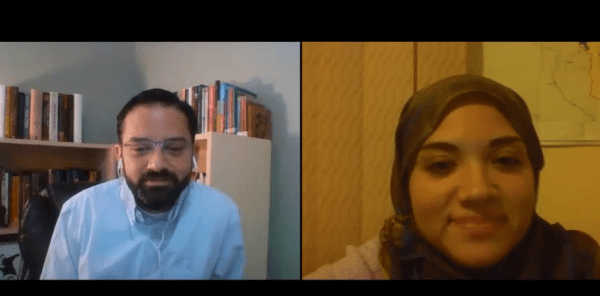In the face of acts of terrorism by ISIS and Donald Trump’s politics of fear channeled against Muslims, this is one of the most important questions of our time. I discussed it with Sheima Salam Sumer. Sheima is a devoted Muslim who earned her Master’s Degree in Counselor Education form the University of South Carolina in 2007 and has worked as a professional counselor in many states, including schools, homes, and offices. She offers free counseling through her website. She also does group and family counseling.
Sheima has written two books. Her first book is titled The Basic Values of Islam. It provides Quranic verses and hadiths about the 70 values of Islam, including kindness and gentleness.
Her second book is titled How to Be a Happy Muslim, InshaAllah: Choosing Inner Peace and Joy with Ideas from the Qur’an, Sunnah, Counseling and Health Fields.
Sheima blogs at her website, How to Be a Happy Muslim, where she engages the Qur’an, the Sunnah, counseling, and health fields. She has recently written a beautiful poem on her site. It’s called “Muslims Stay Strong.” It’s in response to the recent terror attacks of ISIS in Paris. We discuss her important poem in the interview.
MP3
Video
Show Notes
- God’s relationship to mercy – God’s mercy always overcomes God’s wrath.
- Mercy is closely related to compassion and forgiveness
- All mercy seen on earth is from God
- There is a universalism within Islam of God’s mercy. The Qur’an states that God’s “mercy encompasses all things.” The name for God, al-Rahman, the Merciful, is translated as mercy for all. God’s mercy is for all people.
- The Qur’an says that God chose for there to be different religions, so you cannot force people to believe a certain religion when God has not willed that for them.
- Modern counseling talks about the power of our words. If we can train ourselves to speak and think good thoughts, that brings more goodness into the world. Prophet Muhammad encouraged his followers to “speak good or keep silent.” From a mimetic theory perspective, this stops scapegoating before it has a chance to begin.
- Forgiveness in Islam is an extremely high spiritual level. Many verses in the Qur’an encourage Muslims to forgive and overlook. Islam does allow for justice in case someone is wronged, but Islam also states that if you want to get closer to God, then forgive.
- Islam teaches that helping others is a very high deed.
- Islam places great emphasis on caring for the poor. To love the poor is to draw near to God.
- There are hadiths that suggest helping the poor is more important than religious practices like praying and fasting.
- The Qur’an states that to kill one innocent person is like killing the entire human race. (5:32)
- Islam gave rights to women they didn’t have before, such as the right to choose whom they marry, the right to inherit money, that they are equal in the sight of God to men and stopped the practice of burying baby girls in the desert sand because they were seen as an economic burden. Islam told Muslims not to fear, to care for their girls, and to trust that God would provide.
- Fighting is allowed in self-defense in Islam, but if the other side shows any gesture toward peace, then you must stop fighting.
- Jihad means “struggle” and the greatest jihad is the struggle with the ego and the “whispers of Satan.”
- Islamic economic justice says we don’t have to live in fear of scarcity because God will provide us with enough. This allows us to freely share with the poor and marginalized members of culture.
- Islam was not spread by the sword, but by kindness and love. Sheima refers to Sir Thomas Walker Arnold, who stated that Islam was spread by businessmen and by the Sufis. You can read and download Arnold’s book The Preaching of Islam: A History of the Propagation of the Muslim Faith from Scribd.
- In Islam, you please God by doing good in the world and bringing peace, not by terrorism and violence.
- The real “Islamic state” is to live a life of prayer and good deeds.












